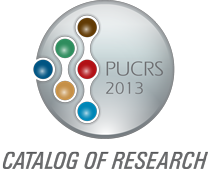Foreword
Research Structures
Energy, Environment, and Biodiversity
- Metallic Materials Engineering
- Solar Energy
- Biodiversity and Ecosystems in Fields and Forests of the Atlantic Forest
- Economic, Human, and Environmental Development
- Primatology
- Genetics, Evolution, Ecology, and Conservation of Carnivores
- Oleochemistry: Processes and Products
- Technologies to Mitigate Environmental Impacts
- Ichthyology
- Ornithology
- The Center for Wind Energy
Humanities and Ethics
- Fundamental Rights
- Theological and Ethical Anthropology
- The Political Authoritarianism and Press in Contemporary Brazil
- Christology within the Contemporary Latin American Context
- Law and Bioethics
- Clinical Bioethics
- Ecclesiology and Emergent Problems
- Analytic Epistemology
- Ethics, Contemporaneity, and Deconstruction: The Philosophical Criticism of Violence
- Immigration, Towns, and Foreigners Narratives of Brazil (1864–1964)
- Criminal Procedure and Democratic Rule of Law
Culture and Education
- Southern Writers Collection
- Architecture and Heritage
- Culture, Subjectivity, and Formative Policies
- Between the Memories and Stories of Schools at Rio Grande do Sul: From the Deutscher Hilfsverein to Farroupilha School (1858-2008)
- Enunciation and Discourse
- Education for Health and Inclusive Education
- Teaching of Physics
- Format Y: Formation in Mathematics for Generation Y
- History of Literature: The Investigation and Diffusion of Sources
- Reading Literature: The School and Other Social Agencies
- Chemical Education
- Relationship between the Nature of Science and Science Education
- Literature, History, and Theories on the Imaginary
- Training of Professors, Licentiates, and Pedagogical Practices
Society and Development
- Companies and Organizations
- Law and Economy
- Study and Research on Violence
- Family, Social Work, and Health
- Architecture and Industrialization
- Agribusiness
- Social Well-being Economics
- Applied Mathematics
- Class Action Lawsuits
- Psychology and Social Policies: Memory, History, and Production of the Present Time
- Inter-organizational Relationships and Systemic Competitiveness
- Parties, Elections, and Political Communication
- Fundamental Principles of Tax Law
- Social Demands and Policies
Information and Communication Technology
- Wireless, Wired, and Optic Communications
- Organizational Communication
- Strategy and Innovation
- Hardware Project Support
- Computing Molecular Biophysics – The Modeling and Simulation of Biosystems
- Technological Development in Telehealth
- Resource Management and Virtualization
- The Management and Governance of Information Technology
- International News at the Global Village
- Communication Science
- Ubiquity and Technological Convergences in Communication
- Aerospace Research
- The Performance Evaluation Group
- The Group on Systems, Signals, and Computing
Biology and Health
- Cancer and Other Pathologies of the Oral and Maxillofacial Region
- Memory
- Molecular and Functional Biology
- Cardiometabolic Risk, Aging, and Nutrition
- Health Education and Work
- Structural Biochemistry
- Pediatric Respirology
- Applied Pharmacology: Characterization of Mechanisms Involved in Pain, Inflammation and Cancer
- Immunology and Immunodiagnostics
- Nephrology
- Neurosciences
- Orthodontics
- The Promotion of Health in Longevity
- Olympic Studies and Health Sciences
- Nerve Regeneration
- Intensive Neonatal Medicine and Congenital Infections
- Aerospace Pharmacy
- Medical Imaging
- Pulmonology
- Orofacial Pain and Temporomandibular Disorders
- Metabolic Transformations of Purines of Biological Importance
- The Study of Parasitosis, Biochemical Parameters, and Hematological Parameters Associated with Aging
- Aerospace Science
- Bioethics and Ethics Applied to Animals
- Pharmacovigilance
- Evaluation and Intervention in the Life Cycle
- Surgery for Obesity and Metabolic Syndrome
- Modification of Lifestyle and Cardiovascular Risk
- Nanostructures and Nanoscopy
- Clinical and Experimental Neuropsychology
- Psychology of Occupational Health
- Memory and Neurodegeneration
- Epidemiology, Neurology, and Immunology
- Chemistry of Natural Products
- Health Economics
Research Structures and Researchers
- RESEARCH STRUCTURES AND RESEARCHERS
- Business School: Management, Accounting and Economics (FACE)
- School of Architecture and Urbanism (FAU)
- School of Biosciences (FABIO)
- School of Aeronautical Sciences (FACA)
- School of Social Communication (FAMECOS)
- Law School (FADIR)
- School of Education (FACED)
- School of Physical Education and Sport Science (FEFID)
- School of Nursing, Nutrition and Physiotherapy (FAENFI)
- School of Engineering (FENG)
- School of Pharmacy (FFARM)
- School of Philosophy and Human Sciences (FFCH)
- School of Physics (FAFIS)
- School of Computer Science (FACIN)
- School of Letters: Languages, Linguistics and Literature (FALE)
- School of Mathematics (FAMAT)
- School of Medicine (FAMED)
- School of Dentistry (FO)
- School of Psychology (FAPSI)
- School of Chemistry (FAQUI)
- School of Social Work (FSS)
- School of Theology (FATEO)
- Institute of Bioethics (IB)
- Institute of Geriatrics and Gerontology (IGG)
- Institute of Research and Development (IDÉIA)
- Institute of Biomedical Research (IPB)
- Institute of Toxicology and Pharmacology (INTOX)
- Institute of the Brain (InsCer)
- Institute of Environment and Natural Resources (IMA)
- Museum of Sciences and Technology (MCT)
Evolution combined with conservation
Studies ranging from the phylogeny of wild animals to microbial communities in bromeliads of the Atlantic Forest comprise the breadth of the activities of the Research Group on Genetics, Evolution, Ecology, and Conservation of Carnivores, led by Professor Eduardo Eizirik. The results have been published in leading international journals, including Nature and Science.
The relationship between evolutionary biology and conservation biology is one of the group’s foci, and the most active research line consists of studies on the genetics, genomics, and ecology of wild carnivores. Currently, the main global conservation strategies for jaguars use genetic data from the group, which is also an international leader on studies of several other carnivore species.
Research on the higher-level phylogeny of mammals is performed by the group in partnership with teams from other countries. The findings have been reported in journals such as Nature, Science, and PNAS, and redefined mammal evolution on a global scale.
The group, in collaboration with researchers from the USA, was a pioneer in the discovery of the genes that control the coat colors of domestic and wild cats. Several coat color genes were discovered and their function and evolution characterized, resulting in articles featured on the covers of the journals Current Biology and Genetics, as well as a recent article published in Science.
The team also leads multidisciplinary efforts targeting the molecular identification of biodiversity, including the Brazilian network of DNA barcodes and metagenomic projects in partnership with the Institute of the Environment and of Natural Resources of PUCRS.
The group maintains scientific cooperation with several international institutions, especially in the USA, in particular with the University of California, Texas A&M University, the Smithsonian Institution, and the Hudson Alpha Institute for Biotechnology.




